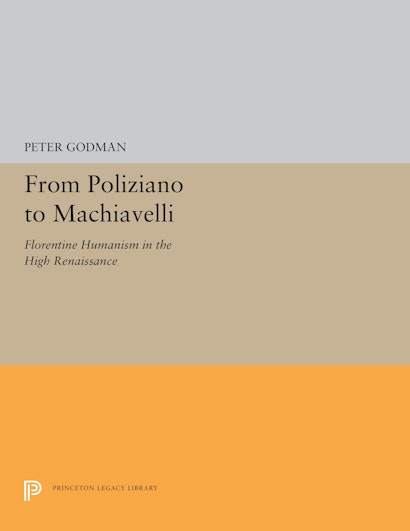From Poliziano to Machiavelli: Florentine Humanism in the High Renaissance


Hardcover
Paperback
ebook
- Sale Price:
- $47.60/£40.60
- Price:
-
$68.00/£58.00 - ISBN:
- Published:
- Jan 15, 2019
- Copyright:
- 1998
- Size:
- 8 x 10 in.
- 9 halftones
- Main_subject:
- History
30% off with code PUP30
Peter Godman presents the first intellectual history of Florentine humanism from the lifetime of Angelo Poliziano in the later fifteenth century to the death of Niccolo Machiavelli in 1527. Making use of unpublished and rare sources, Godman traces the development of philological and official humanism after the expulsion of the Medici in 1494 up to and beyond their restoration in 1512. He draws long overdue attention to the work of Marcello Virgilio Adriani—Poliziano’s successor in his Chair at the Studio and Machiavelli’s colleague at the Chancery of Florence. And he examines in depth the intellectual impact of Savonarola and the relationship between secular and religious and oral and print cultures.
Godman shows a complex reaction of rivalry and antagonism in Machiavelli’s approach to Marcello Virgilio, who was the leading Florentine humanist of the day. But he also demonstrates that Florentine humanists shared a common culture, marked by a preference for secular over religious themes and by constant anxiety about surviving and prospering in the city’s dangerous political climate. The book concludes with an appendix, drawn from previously incaccessible archives, about the censorship of Machiavelli by the Inquisition and the Index. From Poliziano to Machiavelli adds new depth to the intellectual history of Forence during his most dynamic period in its history.
Originally published in 1998.
The Princeton Legacy Library uses the latest print-on-demand technology to again make available previously out-of-print books from the distinguished backlist of Princeton University Press. These editions preserve the original texts of these important books while presenting them in durable paperback and hardcover editions. The goal of the Princeton Legacy Library is to vastly increase access to the rich scholarly heritage found in the thousands of books published by Princeton University Press since its founding in 1905.
Awards and Recognition
- Winner of the 1999 Roland H. Bainton Book Prize, Literature of the Sixteenth Century Studies Conference